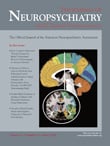To the Editor: Sleep disturbances are common in Huntington’s disease and are often characterized by disruption of day-night patterns.
1 –
3 In general, these sleep disturbances are attributed to factors of comorbidity (depression, mania), medication, or specific symptoms such as chorea or dystonia.
Circadian sleep is regulated by the “biological clock” or “pacemaker” of the suprachiasmatic nucleus. This pacemaker stimulates melatonin synthesis in the pineal gland. Clock genes play a central role in this molecular oscillation process. In an animal model of Huntington’s disease, a marked disruption of expression of the clock genes
mPer2 and
mBal was found in the suprachiasmatic nucleus.
3 This may have negative consequences for the production of melatonin and the circadian sleep rhythm.
We evaluated the occurrence of circadian sleep disorders in end-stage Huntington’s disease by determining deviations of dim light melatonin onset out of the saliva of 10 Huntington’s disease patients with a sleep disorder according to DSM-IV-TR criteria. Patients were all residents in a specialized Huntington’s disease ward of a nursing home who required constant care because of the severity of their disease.
Dim light melatonin onset is the most accurate marker for assessing the circadian pacemaker. It is defined as the time at which a salivary concentration of 4 pg/ml is reached.
4 Normally, this concentration is reached in adults between 7:30 p.m. and 10:00 p.m.
5 Dim light melatonin onset was determined by obtaining hourly saliva samples (from 9:00 p.m. to 1:00 a.m.) by chewing on a cotton plug for 1 minute (Salivetten, Sarstedt Etten-Leur, the Netherlands). Because of the risk of choking the researcher used a plastic clip to hold the cotton plug in place in the patient’s mouth. In the evening, patients were held to food restrictions and were requested to avoid physical strain and bright light. Normal medication use was continued to maintain therapeutic blood levels and to avoid disruption of normal routine.
Dim light melatonin onset was identified in five of the 10 patients. One patient reached the melatonin concentration of 4 pg/ml in saliva before 10:00 p.m. In four of the five patients, dim light melatonin onset was identified between 10:00 p.m. and 12:00 a.m. One patient did not reach the concentration of 4 pg/ml before 1:00 a.m. In one patient, melatonin could not be detected in saliva samples, and in another, the melatonin assessment failed due to an insufficient quantity of saliva. Two patients dropped out. When dim light melatonin onset data were combined with circadian sleep disturbances, we found two patients with delayed sleep symptoms with dim light melatonin onset between 10:00 p.m. and 12:00 a.m. One patient (with undetectable saliva melatonin) showed advanced sleep symptoms.
In conclusion, although sleep research is difficult in severe end-stage Huntington’s disease, the results of our study did provide some support for the hypothesis that there is a relation between Huntington’s disease and circadian sleep disturbances that could be caused by melatonin deficiency. Further research using an experimental treatment with melatonin in a placebo-controlled setting is recommended.

